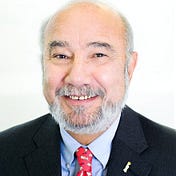Hossein Askari earned his B.S. in Civil Engineering, attended the Sloan School of Management and received his Ph.D. in Economics, all at the Massachusetts Institute of Technology. He was an instructor at MIT, Assistant Professor of Economics at Tufts University, Associate Professor at the University of Texas at Austin in 1975, and Professor of International Business and Middle Eastern Studies at the University of Texas at Austin in 1978, before coming to George Washington University (GW) in 1982, where he served as Chairman of the International Business Department, Director of the Institute of Global Management and Research and the Iran Professor of International Business and International Affairs from 1998 to 2018. In January 2019, he became Emeritus Professor.
He served for two and a half years on the Executive Board of the International Monetary Fund and was Special Advisor to the Minister of Finance of Saudi Arabia. During 1990-1991 he was asked by the governments of Iran and Saudi Arabia to act as an intermediary to restore diplomatic relations; and in 1992 he was asked by the Emir of Kuwait to mediate with Iran.
He developed the concept of Islamicity Indices in 2007. Islamicity Indices have a dedicated website (http://islamicity-index.org) with articles, podcasts and the latest indices, which are updated annually. These indices provide a concise method of conveying Islam's fundamental teachings, a benchmark for assessing how well Muslim communities have adopted these teachings and a roadmap for reformation and development of these communities.
Muslims have been fed a message of Islam that is focused on the largely mechanical facets of the religion, the five pillars, popularized by academics and have been prevented from debating the meaning of the teachings and their practice contained in the Quran. Islamicity Indices demonstrate that countries such as Switzerland, Sweden, Denmark, Norway and New Zealand better reflect Islamic teachings and their envisioned institutions than do countries that profess Islam.
He has written on economic and human development in the Middle East, conflicts and wars in the Persian Gulf, Islamic economics and finance, social and economic justice in Islam, international trade and finance, agricultural economics, oil economics and on economic sanctions, including over two hundred opinion pieces in the NYT, WP, LAT, IHT, Christian Science Monitor, Chicago Tribune, US News and World Report, Foreign Policy, the National Interest, Asia Times Online and in other newspapers and websites.
